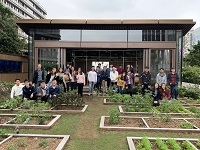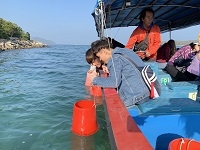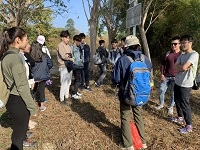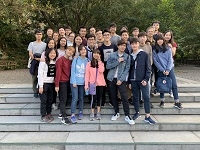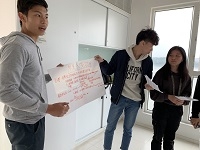|
Post Date: 16 January 2020 Winter Camp 2020: Hong Kong’s ecological value and biodiversityKnown for being a concrete jungle, Hong Kong is famed for its modern cityscape filled with high rise buildings. Unfortunately, very few are aware of its rich ecological value and biodiversity. Hong Kong is a dazzling city of contradictions. With rapid urbanization causing pollution and intensifying climate change, Hong Kong’s ecology is facing severe damage. To arouse students’ awareness about the importance of Hong Kong’s ecology, this year’s Winter Camp offered students a chance to understand local biodiversity and the threats they face, and to explore possible solutions to conserve local ecology. The Winter Camp started with a visit to K11 Musea. Participants learned about the mall’s three key themes -- art, culture and nature. Through understanding the development history of K11, they got to know how this brand is leading the industry in pursuing sustainability, through efforts to balance profit maximization and natural and cultural conservation. After visiting the K11 office building to check out various sustainable building design features, participants also had a chance to visit the Nature Discovery Park inside the mall. The Nature Discovery Park is Hong Kong’s first urban biodiversity museum and sustainability-themed education park, featuring tropical and native plants, an aquarium, and naturally attracted butterflies. In the afternoon, participants set off for Hoi Ha Wan Marine Park, a village in Sai Kung famous for its natural beauty and marine biodiversity. One of the first marine parks in Hong Kong, Hoi Ha Wan Marine Park is a protected area, home to more than 60 types of hard coral and 120 species of coral fish. After a short hike, the group took a boat trip in the sea where corals, sea cucumbers, and sea urchins live. They were given a bucket with a transparent bottom to view the seabed. Unlike in the Victoria Harbour, the water in this region is clean and has high visibility, so it was really a precious opportunity for students to see these rare animals with their own eyes. On the second day, participants went to Long Valley and took an eco-heritage guided tour hosted by The Conservancy Association. Long Valley is a wetland in Sheung Shui, New Territories in Hong Kong. The wetland was originally formed by the rice paddies between Shek Sheung River and Sheung Yue River. Participants learned about the background story of Long Valley and how it got involved in land use conflicts when the Lok Ma Chau Spur Line of KCR was confirmed to be built across the wetland. The tour guides mentioned related government policies in environmental compensation of development, and also introduced local species that could be found in the area, like bats and migratory birds. In the afternoon, participants paid a visit to Kadoorie Farm and Botanic Garden to check out different plants and animals conserved by the farm. Participants were able to see less-familiar local animals and plants, including the Indian muntjac (barking deer), leopard cat and Hong Kong warty newt, among others. Participants learned about the characteristics of the species and gained more knowledge about the biodiversity of Hong Kong. That night, participants engaged in an educational board game designed by local creators and scholars. It is a board game promoting environmental protection with interesting rules featuring Hong Kong’s local species. To win the game, participants had to take note of the survival tactics of different species. The designer of the game incorporated concepts of sustainable development, like the effects of urbanization and succession to enhance participants’ understanding in local biodiversity. Day 3 was designed as a discussion forum conducted in two sessions. The theme of the discussion was threats to Hong Kong’s biodiversity. In session 1, each group had to present their assigned topics (Urbanization, Invasive Species, Overexploitation, Climate Change) to other participants, and propose possible solutions. Participants gained inspiration from the different visits during the camp, and recommended effective methods in solving the problems. In session 2, the groups debated on which environmental problem facing Hong Kong is the most pressing. Through these discussions, they learned to view a problem from different perspectives and gained critical thinking skills. Throughout these 3 days, the Winter Camp provided an excellent platform for students from different schools to gather, learn and share their own views about the sustainable development and ecological conservation of Hong Kong. We hope that students can make good use of the observations and lessons learned from this camp and carry on making a positive impact on our community. |
|
| Date | : | 02 Jan 2020 (Thursday) - 04 Jan 2020 (Saturday) |
| Language | : | Cantonese |

